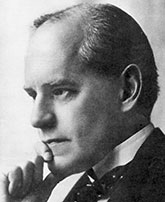John Galsworthy
Critique • Works • Views and quotes

Born
1867
Died
1933
Publications
Plays, novels, stories, poetry, essays, criticism
Writing language
English
Literature
• The Forsyte Saga (1906–1921)
Novels
• The Man of Property (1906)
Novel Series
• The Forsyte Saga (1906–1921)
British Literature
• The Forsyte Saga (1906–1921)
On books, writers and writing
1923
I confess to have always looked for a certain flavour in the writings of others, and craved it for my own, believing that all true vision is so coloured by the temperament of the seer, as to have not only the just proportions but the essential novelty of a living thing for, after all, no two living things are alike. A work of fiction should carry the hall mark of its author as surely as a Goya, a Daumier, a Velasquez, and a Mathew Maris, should be the unmistakable creations of those masters. This is not to speak of tricks and manners which lend themselves to that facile elf, the caricaturist, but of a certain individual way of seeing and feeling. A young poet once said of another and more popular poet: "Oh! yes, but be cuts no ice. "And, when one came to think of it, he did not; a certain flabbiness of spirit, a lack of temperament, an absence, perhaps, of the ironic, or passionate, view, insubstantiated his work; it had no edge—just a felicity which passed for distinction with the crowd.
Let me not be understood to imply that a novel should be a sort of sandwich, in which the author's mood or philosophy is the slice of ham. One's demand is for a far more subtle impregnation of flavour; just that, for instance, which makes De Maupassant a more poignant and fascinating writer than his master Flaubert, Dickens and Thackeray more living and permanent than George Eliot or Trollope. It once fell to my lot to be the preliminary critic of a book on painting, designed to prove that the artist's sole function was the impersonal elucidation of the truths of nature. I was regretfully compelled to observe that there were no such things as the truths of Nature, for the purposes of art, apart from the individual vision of the artist. Seer and thing seen, inextricably involved one with the other, form the texture of any masterpiece; and I, at least, demand therefrom a distinct impression of temperament. I never saw, in the flesh, either De Maupassant or Tchekov—those masters of such different methods entirely devoid of didacticism—but their work leaves on me a strangely potent sense of personality. Such subtle intermingling of seer with thing seen is the outcome only of long and intricate brooding, a process not too favoured by modern life, yet without which we achieve little but a fluent chaos of clever insignificant impressions, a kind of glorified journalism, holding much the same relation to the deeply impregnated work of Turgenev, Hardy, and Conrad, as a film bears to a play.
Preface to Villa Rubein and Other Stories
A writer they say, should not favouritize among his creations; but then a writer should not do so many things that he does. This writer, certainly, confesses to having favourites, and of his novels so far he likes best: The Forsyte Series; "The Country House"; "Fraternity"; "The Dark Flower"; and "Five Tales"; believing these to be the works which most fully achieve fusion of seer with thing seen, most subtly disclose the individuality of their author, and best reveal such of truth as has been vouchsafed to him.
Preface to Villa Rubein and Other Stories.

